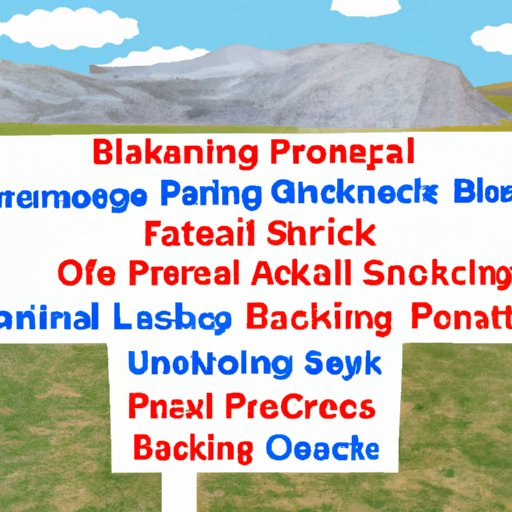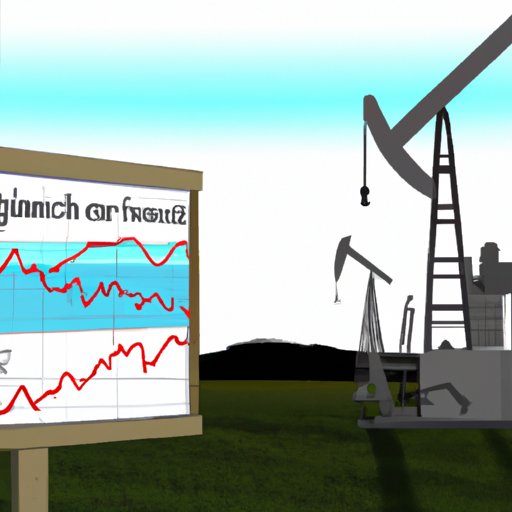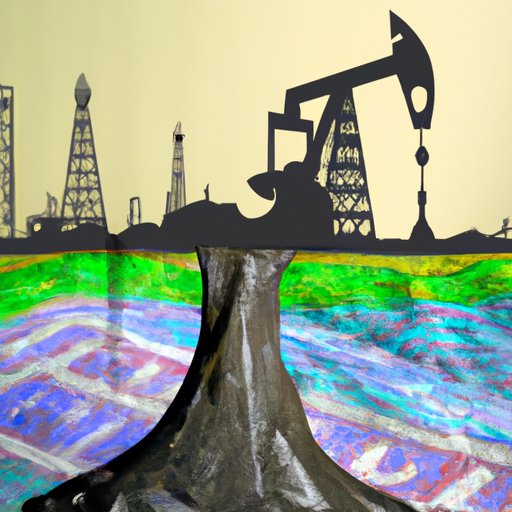Introduction
Fracking, also known as hydraulic fracturing, is a process used to extract natural gas and oil from beneath the Earth’s surface. In this article, we will explore how fracking works, discuss the potential environmental risks associated with the practice, examine the benefits and drawbacks, investigate the economic impact, and compare it to other forms of energy production.
Explain the Process of Fracking: Step-by-Step
Before drilling a well, an operator must first identify a suitable location. Once the location has been identified, the operator will then drill a vertical shaft through the Earth’s surface and into the targeted rock formation. After the well has been drilled, the operator will insert a steel pipe into the well and cement it in place. This pipe serves as a barrier between the well and the surrounding environment, preventing any contaminants from entering the well.
The next step in the process is to inject water and chemicals into the well at high pressure. This causes the rock to fracture, allowing natural gas and oil to flow out. The mixture of water, sand and chemicals is known as “frac fluid” or “slickwater”. The sand helps to keep the fractures open, allowing the gas and oil to continue flowing out of the well.
Once the fracking process is complete, the operator will begin to pump out the frac fluid, along with any gas and oil that has been extracted. The collected gas and oil is then transported to refineries, where they are processed into usable products such as gasoline and diesel fuel.

Outline the Potential Environmental Risks Associated with Fracking
Despite the potential economic benefits of fracking, there are numerous environmental risks associated with the practice. One of the most significant concerns is the possible contamination of groundwater. A study conducted by Stanford researchers found that “chemicals used in the fracking process have been detected in groundwater near fracking sites.” 1 While the amount of contamination is typically low, it can still have adverse effects on drinking water and ecosystems.
In addition to groundwater contamination, fracking can also lead to air pollution. According to the Environmental Protection Agency (EPA), “air emissions from the fracking process can include volatile organic compounds (VOCs), hazardous air pollutants (HAPs) and methane.” 2 These pollutants can then be released into the atmosphere, leading to smog and other forms of air pollution.
Finally, fracking can also have an effect on wildlife and habitats. A 2018 study published in Science Advances found that “the intensity of fracking activity [was] associated with decreased abundance and diversity of birds, small mammals, and amphibians.” 3 In addition, the study found that fracking could also alter the behavior of some species, causing them to avoid areas of intense fracking activity.

Discuss the Benefits and Drawbacks of Fracking
Despite the potential environmental risks associated with fracking, the practice does have some advantages. For example, fracking has the potential to reduce dependence on foreign oil, as well as create jobs in the energy sector. Additionally, fracking can also help to reduce the cost of energy, as natural gas is generally cheaper than other forms of energy.
On the other hand, there are also some drawbacks associated with fracking. For instance, the process can be expensive, as operators must pay for the equipment and chemicals used in the process. In addition, fracking can also lead to earthquakes, as the fracturing of rocks can cause seismic activity.

Investigate the Economic Impact of Fracking
In addition to the environmental risks, it is also important to consider the economic implications of fracking. On the one hand, fracking can provide a financial boost to local economies, as operators must pay for land leases and taxes. In addition, fracking can also lower energy costs, as natural gas is generally cheaper than other forms of energy.
At the same time, there are also some long-term economic concerns associated with fracking. For example, a 2017 report from the International Energy Agency found that “the majority of shale gas wells in the United States are unprofitable when evaluated over their lifetime.” 4 This suggests that while fracking may provide a short-term economic boost, it may not be a sustainable form of energy production in the long run.
Compare Fracking to Other Forms of Energy Production
When considering the potential risks and benefits of fracking, it is important to compare it to other forms of energy production. For example, coal and nuclear power both produce more carbon dioxide emissions than natural gas, making them less environmentally friendly than fracking. On the other hand, renewable energy sources such as solar and wind are far more sustainable than fracking, as they do not rely on finite resources.
Overall, it is important to consider both the environmental and economic impacts of each type of energy source before making a decision. As the world shifts towards cleaner forms of energy production, it is essential to understand the advantages and disadvantages of each type of energy source to ensure that the best decisions are being made.
Conclusion
To sum up, fracking is a process used to extract natural gas and oil from beneath the Earth’s surface. While it can provide a short-term economic boost, it can also lead to potential environmental risks such as groundwater contamination and air pollution. Additionally, it is important to consider the long-term economic implications of fracking, as well as compare it to other forms of energy production.
Ultimately, it is important to weigh the pros and cons of fracking before making a decision. With proper regulations and safeguards in place, fracking can be a safe and sustainable form of energy production. However, without proper oversight, it can have devastating consequences for the environment and economy.
(Note: Is this article not meeting your expectations? Do you have knowledge or insights to share? Unlock new opportunities and expand your reach by joining our authors team. Click Registration to join us and share your expertise with our readers.)
